For the last twenty-seven years, today has marked the anniversary of an infamous event: Iraq’s brutal invasion and subsequent occupation of Kuwait, which began on August 2, 1990, and which was brought to an end on February 28, 1991. The regional and international effects of numerous aspects of the trauma then inflicted upon Kuwait remain ongoing. Like Kuwait itself, the world, even now, has yet to fully recover.

Over a quarter century later, important postwar facets of what Iraq did to Kuwait fall short of definitive closure. And they defy effective description. The international legal requirement that an aggressor provide prompt, adequate, and effective compensation for a war’s victims was not honored at the end of hostilities. Despite continuing United Nations-supervised efforts to collect on this inhumane debt, what is due has still not been paid.
The Missing in Action and Context
A full accounting of Kuwait’s and other countries’ missing citizens swept up and carted off to Iraq in the war’s waning hours – in the immediate aftermath of the conflict its main cause celebre – continues to remain incomplete. The reason is not for lack of effort. After Kuwait’s liberation, an informal and unofficial effort was mounted by George Washington University’s Elliott School of International Affairs to provide an estimate of the MIAs’ status.
The focus group included diplomats, scholars, media representatives, American armed forces’ civil affairs personnel, and other individuals who fought to liberate Kuwait. Their unscientific consensus reported that more than 400 of the missing Kuwaitis died after they were captured. The fate of more than 200 of the missing, however, was unknown.
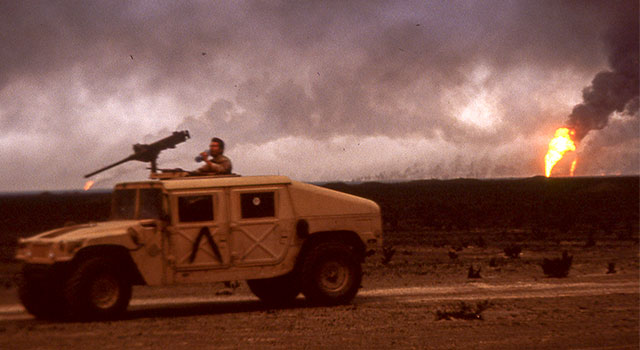
That possibly countless others remain missing is no small matter. The numbers in question, to some, may seem few. Not so, however, for those among the loved ones who tear up at the thought of them. Not so either for those who, despite the absence of grounds to warrant optimism for a fortuitous ending to their pining, and continue to wait and pray for their return.
We Americans would do well to stop and think about this for a moment. We are often criticized, and rightly so, for having an empathy deficit when it comes to understanding the suffering of people in other countries and situations. An irony in this needs to be understood and underscored. The irony is that many in the United States demand that people in other countries understand us. For those in front of an American Consular Officer with ticket in hand to visit a friend or relative in Atlanta, Baltimore, Chicago, or wherever, but who lack such empathy along with the understanding and civility that comes with it, they need to be wished good luck in obtaining a visa to the United States.
Equivalencies and Empathy
A reality in these regards is humbling: the number of Kuwaitis and others missing in the 1990-1991 conflict was a tenth of a percent of the country’s population. Compare that to what would have been the number of Americans missing then, when the U.S. population was 270 million. The analogical equivalent is stunning. It would be as though 270,000 Americans suddenly went missing. It would be as though they were forcibly carted across the border to Canada or Mexico and to this day remain missing and unaccounted for.
Or, take France and Great Britain. France’s and Great Britain’s populations were each roughly 50 million then. Hence, it is the same as if 50,000 French or British citizens had been taken prisoner by an invading army. If this does not place the Kuwaiti predicament in perspective, it is hard to imagine what would.
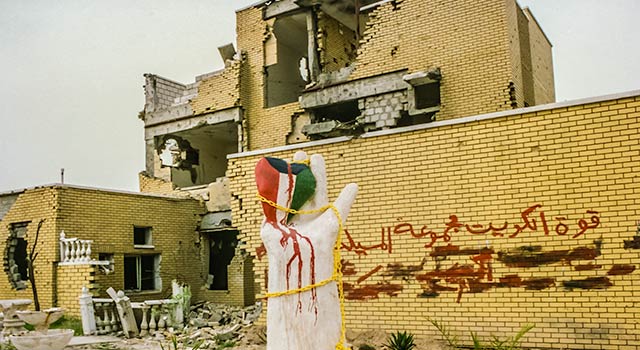
Ponder this: most Kuwaitis of my acquaintance know no fewer than four of those missing. Never since have they seen or heard from or about any of them. In addition, the same number are also aware of at least forty of their friends and relatives who still carry deep emotional scars as a result of the disappearance of their loved ones.
Whether viewed in the here and now or in the rearview mirror, the costs and losses of the invasion and occupation of Kuwait remain beyond the imagination. The consequences in terms of health and human life, in terms of jobs, in terms of aspirations trampled, in terms of mental and material wellbeing among the invaded, may never be fully known.
Imponderables
Also unknown are other costs. These include those incurred by the citizenry in the land of the invader. The moral and material impact of the invasion and the ensuing sanctions there were also astronomical. The consequences of those costs, however, were of another nature, intensity, and extent.
As with the tragedy inflicted upon Kuwait, the American public may never come to grips with these costs either. One small insight, albeit but a snapshot, into the altogether different human harm levied by the “liberator” is encapsulated by the following. Former Secretary of State Madeleine Albright was asked in a 1996 television interview whether she thought the reported deaths of hundreds of thousands of Iraqi children from the U.S.-led economic sanctions imposed after Iraq’s Kuwait invasion were acceptable to achieve U.S. policy objectives. Her response was, “Yes, …the price is worth it.” This monumentally callous remark continues to haunt the secretary’s image and that of the U.S. government to this day.
But there is more. The physical damage and the psychological devastation inflicted upon the Kuwaiti people was and is one thing. The ensuing costs to the citizens of Iraq – to the country’s widows, to its orphans, and to innumerable other civilians who had nothing whatsoever to do with the war – were and are quite another. Even now, economists’ conservative estimates place the extent of the damage in the hundreds of billions of dollars. Such conclusions look like typographical errors. Would that they were.[pullquote]The physical damage and the psychological devastation inflicted upon the Kuwaiti people was and is one thing. The ensuing costs to the citizens of Iraq – to the country’s widows, to its orphans, and to innumerable other civilians who had nothing whatsoever to do with the war – were and are quite another. Even now, economists’ conservative estimates place the extent of the damage in the hundreds of billions of dollars. Such conclusions look like typographical errors. Would that they were.[/pullquote]
What Was Achieved
Against any further measurement of the human devastation visited upon Kuwait, there would arguably be the following additional calculations. Among them would be those that occurred as the crisis unfolded. Here, the focus is not only on the humanistic and moral fronts that embraced considerations which were ever present from beginning to end. The focus is also on what occurred in the GCC-U.S. geopolitical, defense, and economic relationships.
Analyzing these dynamics requires donning a different set of lenses. In no other way can one reach an insightful level of understanding of how, for instance, international law effectively came into play. Indeed, for one of the first and last times in the past half century, the United Nations’ Charter’s prohibition of the acquisition of territory by force was upheld. Not only did Kuwait’s citizenry and other inhabitants regain their safety and freedom. With this came something else: their dignity, which had been lost, was restored.
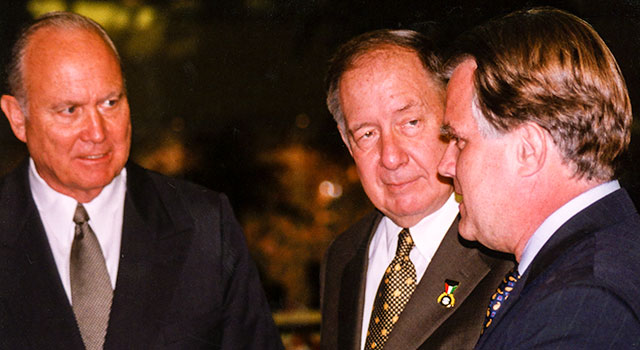
In the process were still other achievements. For one, Kuwait’s national sovereignty, which had been stolen, was returned. Additionally, Kuwait’s political independence – which had been smashed to smithereens by the Iraqi invasion and occupation – was regained.
Something else happened as well. The territorial integrity of this small and defenseless country, which Iraq violated, was restored. These three characteristics are noted herein for a reason: for the entire post-Second World War period, this triad of attributes had a sacrosanct dimension to it.
The three components were considered by the international community not merely as adjectival descriptions. Nor were they conceptually interlinked to underscore a set of geostrategic and geopolitical points. Rather, they depicted an idealism and a self-serving practicality that Great Powers and non-Great Powers alike wished to see reflected in the nature of countries newly freed from imperialism or armed conflict and, indeed, that all nations should be expected to prove in order to be admitted into the United Nations.
Stated differently, they conveyed the sine qua non for existence as a member of the international community in good standing. A Kuwait whose invasion and occupation were allowed to stand would have forfeited that status. In stark contrast, a Kuwait that was demonstrably sovereign, free, and intact could prove that it warranted membership as much as any other country.
[pullquote]Not only did Kuwait’s citizenry and other inhabitants regain their safety and freedom. With this came something else: their dignity, which had been lost, was restored.[/pullquote]In comparison to Palestine and other examples, this was no small feat. It is a status that Kuwait had but was stolen. It is a status that Palestine has yet to gain. It is a status that but for the internationally-concerted action led by the United States, Great Britain, eleven of Kuwait’s fellow Arab countries, and others, it is questionable whether Kuwait would have regained.
Regarding Kuwait’s territorial integrity, the boundary between Iraq and Kuwait was effectively delineated by international community. Not just that, the boundary between the two countries was reconfigured and drawn differently than before. Indeed, for the first known time in modern international organization history, the new Iraq-Kuwait borderline would henceforth become inviolate. It would be guaranteed by the United Nations Security Council, the only boundary in the world to be so deemed.
Here is cause for background, context, and perspective. In the post-World War Two period, in few if any other cases have the norms of interstate behavior been as acknowledged and underscored by the world’s highest political body. The Kuwait-Iraq border agreement set a one-of-a-kind marker for future conflicts and for international organizations. It is the world’s only frontier guaranteed by the globally constituted body to which the security of virtually everyone is entrusted.
Lessons Learned
The 1990-1991 Kuwait Crisis[1] is indeed a rare textbook case for the study of international relations. An examination of the Crisis illustrates what can be achieved when and if the legitimate needs, concerns, interests, and aspirational goals of principled international leaders are aligned. Given the immediate previous decades of global competition between communist and their allied countries, on one side, and non-communist powers on the other, not least among what was remarkable with regard to the Crisis was that the necessary “when and if” prerequisites of leadership and statesmanship were in near-perfect alignment. Of more than noteworthy emphasis, they have not been so aligned since.
In terms of conflict resolution, the outcome of this event must not be underestimated. It shows what can be done when those in the forefront refuse to accept taking the easy option.
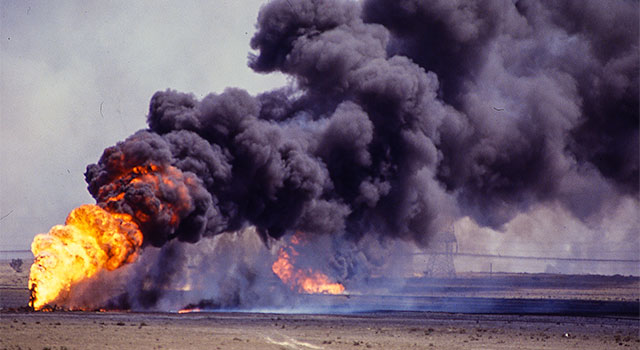
Here is a major reason why so many refer to the Kuwait Crisis as a teachable moment. What happened to Kuwait and what came as a consequence serves as a quintessential point of reference. It illustrates unmistakably what can be, could be, and, in this case, was accomplished by principled, strong-willed, and capable leaders – arguably in this instance statesmen – acting in concert effectively.
Such were the characteristics of the heads of state, foreign and defense ministers, armed forces chiefs of staff, and commanders of units in the field that formed the concerted international action.
American Assets
One would have to look long and hard to find an American leader before or since with the range and depth of experience that President George H. W. Bush brought to bear throughout the Kuwait Crisis. Before becoming president, he had served in Congress, been Director of the Central Intelligence Agency, served as America’s chief envoy to China, and been Vice President. He was also the one U.S. President more than any other in American history with vast direct personal knowledge of the international energy industry.
President Bush’s earlier stint as U.S. Ambassador to the United Nations was also brought into play. That experience provided him a network of friends, allies, and working partners the likes of which no American President has come close to matching, let alone surpassing.
Supporting President Bush’s efforts was an invaluable team of distinguished statesmen. His outstanding Secretary of State, James Baker, set a standard for clear, forthright, and strong leadership. Secretary Baker demonstrated, like few subsequent American chief diplomats, what a secretary of state should be and can be in times of crises. National Security Advisor General Brent Scowcroft was an additional stalwart who was in just the right place at the right time.
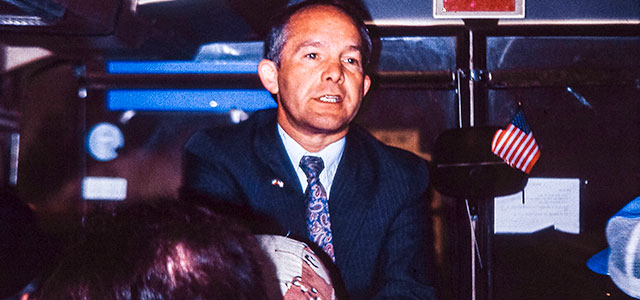
Another who was held to the same high standard was U.S. Ambassador to Saudi Arabia Chas Freeman, the consummate American diplomat most directly involved with the Saudi Arabian government in Riyadh. Vital, too, was U.S. Ambassador to Kuwait Edward (“Skip”) Gnehm, who worked closest with the Kuwaiti government-in-exile in Taif, Saudi Arabia.
America’s Arab Allies
Working hand-in-hand with these Americans was a collection of exceptional Arab leaders. First was Saudi Arabia’s monarch. King Fahd made perhaps the most extraordinary decision of his life with regards to what happened to Kuwait: he invited hundreds of thousands of U.S. military forces into the Kingdom. To state that what the King did was controversial is truthful but misses the point.
Consider that, in a later interview, an Arab journalist asked King Fahd about how he made decisions and the king simply answered, “I don’t.” Rather, the king noted the classical Arab and Islamic traditions regarding the roles of consultation and consent in reaching decisions that are certain to impact one’s constituents. King Fahd said, paraphrased here, “One might best consider my role in our country’s decision-making process as that of a press conference spokesman. That is, in all my decades of public life as a leader, all I have done is declare what has been reached through the process of consultation and consensus among those most qualified to deliberate whatever matter is under consideration.”
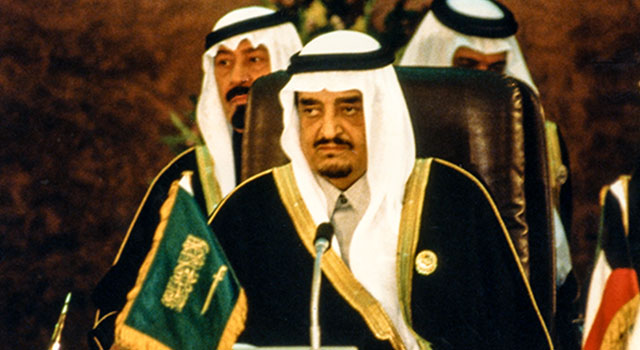
“There has been only one exception. It was when, in the absence of a consensus among the Kingdom’s most prominent leaders, I took the decision and risk on my own to invite the armed forces of our major allies into the Kingdom. I did so in the firm belief that in no other way would it be possible not only to prevent the forces that had invaded Kuwait from continuing onward into the Kingdom and beyond. I did so also to compel the invaders to reverse their aggression.”
In matters related to one’s country or a treasured neighbor, would that there were more comparable risk-takers when the questions are ones of life or death – of a nation no less than a people – as in the case of the Kuwait Crisis.
Additional key Saudi Arabian leaders working with King Fahd, who in their own ways made all the difference in the world, were Minister of Foreign Affairs HRH Prince Saud Al-Faisal; Director General of Saudi Arabia’s General Intelligence Directorate, the Kingdom’s main foreign intelligence service, HRH Prince Turki Al-Faisal; Saudi Arabian Ambassador to the United States HRH Prince Bandar Bin Sultan, doyen of all the world’s foreign chiefs of mission; and a Saudi Arabian diplomat then stationed at the Kingdom’s embassy in Washington, Adel Ahmed Al-Jubeir.
Working back and forth between the embassy and his outposts alternatively in Riyadh and Dhahran, the latter was indefatigable. He personally facilitated the ability of more than 1,000 journalists from all over the globe to come to the Kingdom. He allowed them to remain there. Al-Jubeir permitted the visiting foreign media to interview at will whomever they pleased. He enabled them to participate in cultural excursions. He supported their ability to write what they saw and experienced, so that the world would not be left in the dark. Little wonder that he would subsequently be appointed the Kingdom’s foreign minister upon the passing of the extraordinarily gifted, dedicated, and accomplished Prince Saud Al-Faisal.

In addition to these and other Saudi Arabian leaders, there were several more of particular note. One was GCC Secretary General Abdulla Y. Bishara. After a decade-long stint as Kuwait’s Ambassador to the United Nations from 1971 to 1981, Bishara was appointed founding Secretary General of the Gulf Cooperation Council (comprised of Bahrain, Kuwait, Oman, Qatar, Saudi Arabia, and the United Arab Emirates). He had held this extraordinary position of trust and confidence for nearly a decade when the Kuwait Crisis erupted – and would hold it for two more years afterwards. For the purpose of maximizing every contact possible, the veteran Kuwaiti diplomat and his former ambassadorial colleague President Bush had established exceptionally close personal ties. Indeed, the two had served simultaneously as their respective countries’ Ambassadors to the United Nations in the 1970s.
Two other effective Arab leaders were, one, the then-Kuwaiti Minister of Foreign Affairs, at the time the doyen of all the world’s foreign ministers, and now the country’s ruler. Another was then-Ambassador of Kuwait to the United States, the late Shaikh Saud Nasser Al Sabah. No Kuwaiti diplomat in the United States worked more assiduously to liberate his country. Aiding him were three other noteworthy Kuwaiti leaders: Dr. Hassan Al-Ebraheem[2], Fawzi Sultan[3], and Saif Abbas Abdallah[4].
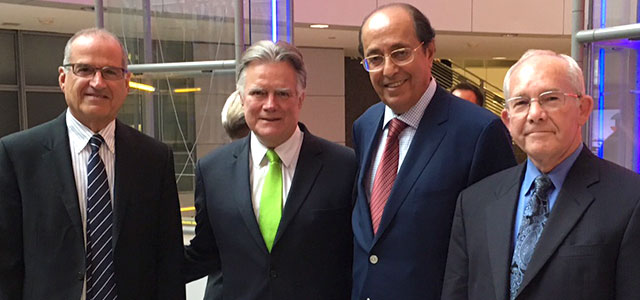
President Bush and his team of principal advisers, on one hand, and the exceptional and gifted group of GCC Arab leaders, on the other, all of them already extraordinarily effective in their own right, would become more so acting collectively. Together they personified what morally courageous leadership is all about. Indeed, they forged a mostly rock-solid block among the ten non-permanent members of the United Nations Security Council. The only exception was Yemen President Ali Abdullah Saleh, who had long been aligned with Iraq.
Other International Leaders
Among the non-Kuwaiti, non-Saudi Arabian, and other GCC leaders, the most prominent among President Bush’s western counterparts was British Prime Minister Margaret Thatcher, followed by the heads of state of China (where Bush’s having been the chief American envoy had come in handy), France, Great Britain, and the Soviet Union.
In Mrs. Thatcher, Bush was able to count on much. Great Britain had on numerous occasions acknowledged the vital importance of Kuwait’s financial holdings in London to the Pound Sterling and, by extension, to the British economy. It was not just Kuwait’s massive deposits in London-based banks, investment houses, and other financial institutions. It was also the Kuwaiti government being the largest holder of shares in British Petroleum. The latter was a mainstay of the British Treasury. It was also vital to the country’s manufacturing sector.
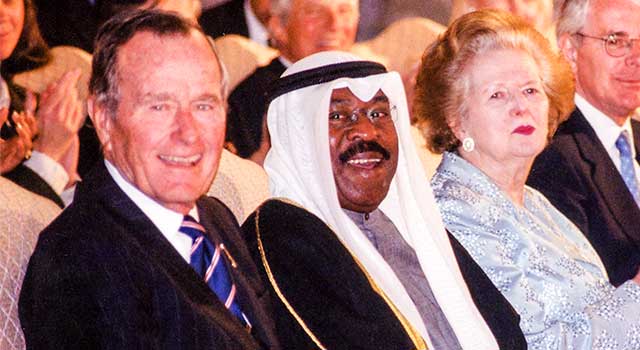
Indeed, Kuwait’s hydrocarbon and monetary might helped drive much of the engines of Great Britain’s economy. This existential reality was diplomatically encapsulated when Kuwait gained its full sovereignty and independence from Great Britain in July 1961. Tellingly, the latter agreed constitutionally to come to Kuwait’s defense should its sovereignty and independence be attacked or threatened.[5]
One of the most revealing statements that helped guide what would subsequently unfold was what Mrs. Thatcher said to Bush in late-August 1990, when discussing how to enforce U.S. sanctions on Iraq: “this is no time to go wobbly.” Wobbly the American President very much did not go. Nor did the international assemblage of countries determined to reverse Iraq’s aggression go wobbly either.
[pullquote]President Bush and his team of principal advisers, on one hand, and the exceptional and gifted group of GCC Arab leaders, on the other, all of them already extraordinarily effective in their own right, would become the more so acting collectively. Together they personified what morally courageous leadership is all about.[/pullquote]France’s contributions were also crucial. The reasons, however, were more complicated and conflicted. At the time of its invasion of Kuwait, Iraq owed Paris some 4.5 billion dollars for weapons and equipment purchased during the 1980-1988 Iran-Iraq war. By any standard this was a substantial sum. Understandably, the French wished to see the debt repaid. The likelihood for that occurring, to be sure, was to be significantly lessened if Iraq were to be repelled and defeated. This is the stuff of foreign policy nightmares for foreign ministers and heads of state: how to reconcile policies that contain glaring contradictions in nature and intent.
In comparison, France had far less at stake in Kuwait.
Yet, the GCC having established the principle that an attack on one would be interpreted as an attack on all tipped the geopolitical scales in Kuwait’s favor. It put its finger on the scale of the potential financial ones, too, for France had major economic interests in Qatar, Saudi Arabia, and the UAE.
Of Wild and Unpredictable Cards
The most wild and unpredictable card, to be sure, was America’s longstanding nemesis, Moscow. But here, too, is where leadership was on display. President Bush was supported overwhelmingly not only by France, Great Britain, and the entire rest of the then 12-nation European Union. With Saudi Arabia’s Prince Saud and the GCC’s Abdulla Bishara working tirelessly among their Arab and Islamic colleagues from other nations, the United States, America’s Arab allies, and the internationally-concerted coalition that was forged to liberate Kuwait was hardly isolated. The beleaguered Arab and Islamic GCC member-state was also supported by the Organization of African Unity, a majority of the then 21-member nation League of Arab States, the 57 member-countries of the Organization of the Islamic Conference, and all but Cuba among the then 33-member countries of the Organization of American States.
Yet one of the most important decisions Bush had to make in confronting the Kuwait Crisis was whether to ignore, confront, or seek the hand of friendship and collaboration of Soviet President Mikhail Gorbachev. In this, Bush wasted no time. Within days of the Iraqi invasion and occupation, he let it be known in the clearest terms that he would do nothing to try to upstage Gorbachev. Bush knew that upon Gorbachev’s cooperation in addressing the Kuwait Crisis would depend so much else in terms of the future relationship between the two heads of state.
This was apparent when the two leaders met in Helsinki, Finland, and discussed the Kuwait Crisis and other matters of state, with the media’s cameras filming it all, on September 9, 1990. On that occasion, Bush declared that the United States would confine itself to liberating Kuwait from Iraq’s aggression. He proclaimed that American forces would not invade and occupy Iraq absent a UN Security Council resolution authorizing such a move.
[pullquote]One of the most important decisions Bush had to make in confronting the Kuwait Crisis was whether to ignore, confront, or seek the hand of friendship and collaboration of Soviet President Mikhail Gorbachev.[/pullquote]In retrospect, it is apparent that neither Bush nor Gorbachev nor any of the other permanent five UN Security Council members considered that an invasion of Iraq by the forces being forged to liberate Kuwait would be either wise or necessary. While many would subsequently argue to the contrary, history to date would appear to have concluded that Bush, Secretary of State Baker, and National Security Adviser Scowcroft were proven correct and the others proven wrong.[6]
In any event, the joint leadership between the metaphoric Russian Bear and the American Eagle, as the saying goes, meant all the difference in the world. Kuwait’s and the other GCC leaders and their fellow Arab partners were able to cooperate and coordinate effectively to a degree unprecedented among Arab governments and their respective militaries and diplomats in modern history.
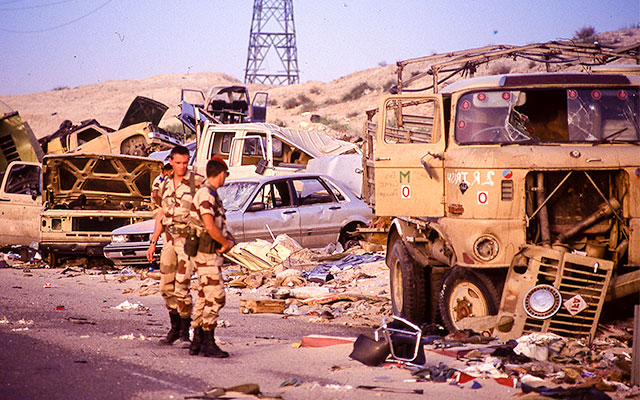
At the time and in retrospect, no one would have wagered that such historic archrivals for strategic advantage and economic gain in the broader Middle East as the Soviet Union and the United States would end up voting identically with one another. Indeed, except for Moscow’s and Washington’s united position in voting for the 1987 UN Security Council Resolution that led to the end of the Iran-Iraq War, never before had the United States and the Soviet Union joined forces as they did with regard to the Kuwait Crisis – indeed, as they did on each of the dozen UN Security Council resolutions passed during the seven month conflict. Herein lies a possible lesson, or if not that then at least a reminder to the incumbent American and Russian heads of state, of what can happen when the two countries’ leaders can agree to cooperate seriously and effectively in matters pertaining to war and peace.
Shifting Balances of Power
It is staggering how far the then-enormous respect and high regard for the American government and people has fallen in the relatively short historical period since this event. Where’s an example of the kind of statesmanship on display throughout the Kuwait Crisis having been repeated? Does one have to travel backward, not forward? Where is it now?
To find today’s moral giants, does one have to travel backward? Forward? Merely look around?
For some time after the reversal of Iraq’s aggression there were reports of Kuwaiti families naming their newborn babies after President Bush. In the days after the guns on both sides had fallen silent, Kuwaitis sprayed the phrase “Yankee, Don’t Go Home” on the American embassy’s walls.
Associated with the positive acclaim for what the United States had done to forge a coalition that cooperated to liberate Kuwait was the immediate resolve by President Bush thereafter to work towards the creation of a new world order. As proof that he meant what he said, he declared his intention to bring the Palestinian and Israeli leaderships together, ultimately in Madrid, to join forces for the purpose of negotiating a peace agreement. This he succeeded in doing in September 1991, setting the stage for President Clinton, who bested him in the national presidential elections in 1992, exercising further leadership aimed at bringing an end to the long-simmering Israeli-Palestinian conflict.
Less prominently noted at the time was what Kuwait and its fellow GCC member states were able to achieve. On March, 6, 1991, not long after President Bush announced his new world order initiative, the foreign ministers of the six GCC member states plus their Egyptian and Syrian counterparts that had joined with the GCC and the Allied countries to liberate Kuwait, gathered to proclaim the Damascus Declaration – their echo at the regional level of President Bush’s declaration and commitment at the global level, in itself another precedent in the conduct of statesmanship in the realm of world affairs that the Kuwait Crisis afforded.
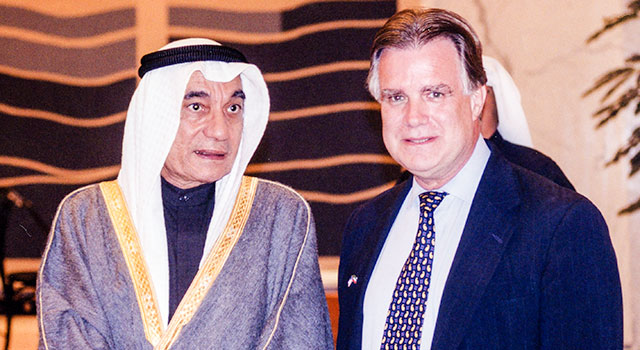
The Declaration’s most important principle was what the parties argued had been underscored years earlier in the March 5, 1975 Algiers Accord between Iran and Iraq: the principle of non-interference in the domestic affairs of other countries. If there has been one pan-GCC ironclad principle emphasized by the members more than any other since the GCC’s inception in May 1981 – and the one most pointedly directed by a majority of the GCC’s members at the revolutionary government of Iran – it has been this one. The evidentiary trail of when and how the GCC countries, Egypt, and Syria proclaimed in the strongest possible terms their adamant opposition to foreign intrusion in their internal political dynamics – and how this lies at the core of the GCC member states disputes with Tehran – is found in the March 1991 Damascus Declaration.
What the Damascus Declaration also represented was something else that in concept and practice was unprecedented and thus in its own way transformative, certainly for the Arab world if not also Iran, Israel, and potentially Turkey. This was the particular aspect of how the Damascus Declaration countries sought to establish a new semblance of a regional balance of power between and among the Arab countries.
Such a balance had come into being in the wake of the 1979 peace treaty between Egypt and Israel.[7] Since the signing of the Camp David Accords, there had been a kind of unofficial, but nonetheless effective, area-wide symmetry of power in the Arab world vis-a-vis Israel and between specific Arab countries and non-Arab Iran. As a result of the Kuwait Crisis, however, that balance no longer existed.
The signatories to the Damascus Declaration were keen to indicate regionally that the way forward would have to be in step with three things: (1) respect for the principles of non-interference in other’s domestic affairs, (2) the peaceful settlement of disputes in accord with official legal and diplomatic principles, and, also, (3) agreement that the sovereignty of the Arab world’s natural resources would henceforth reside in the country in which the resources were located.
This latter provision may have sounded innocuous, but in intent and substance it was not. It was meant to put an end to an earlier suggestion and, in some cases, implicit claim by less well-endowed Arab countries that they ought to be entitled to a share of the more bounteous resources of their less populous fellow Arab countries.
The Post-Kuwait Crisis Era
The period immediately following the Kuwait Crisis was unique and, in retrospect, seemingly a very long time ago, indeed in another era. It was where Americans could be seen more often than not as doing the right things, in the right way, with the right people. Among GCC citizens there was genuine love, admiration, and appreciation for what the United States had done to lead and keep the region away from what would otherwise almost certainly have been not just a regional disaster but, very likely, a global one too.
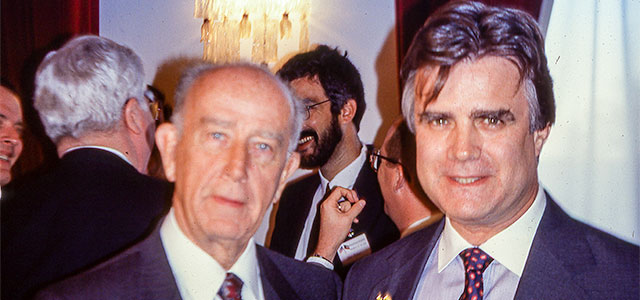
The love affair with America among many in the GCC region, other than Kuwaitis, would be short-lived. In January 1993, the Clinton administration took the reins from the Bush administration and soon concluded the first Oslo Accord. The American and other hype surrounding this so-called peace process proved naïve if for no other reason that over the course of Bill Clinton’s presidency Israel’s continued taking of Palestinian land and other resources – with no penalty or even effective admonition from those extolling reverence and respect for the rule of law – continued apace.
As a result, in September 2000 the Second Palestinian Intifada erupted.[8] With it came the dramatic internationally-televised video of a Palestinian father ineffectively clutching his son, Muhammad al-Durrah, who was killed by Israeli gunfire. That the boy was living until that moment in his own land but the soldier who killed him was there illegally as a foreign occupier was a lesson not lost on anyone.
If those developments were not enough to vitiate most of the goodwill engendered by the elder President Bush in America’s reaction to the 1990-1991 Kuwait Crisis, the terrorist attacks against the United States on September 11, 2001, and the globally perceived over-reaction by Washington officialdom that followed, had the effect of fundamentally changing the relationship.[9]
Then came September 11, 2001
In comparison with years past, since the 2001 terror attacks in New York City it has been extraordinarily difficult to maintain the kind of deep, robust, and diversified relationship that had existed earlier between the United States and Saudi Arabia and, to an extent, between Washington and Kuwait. A reason is that various among both countries’ citizens have been associated with extremist movements. These, it is agreed, have often been opposed to various Western-aligned policies of their countries’ governments.
Alongside these troubling trends and indications, however, have been numerous positive ones. For example, Kuwaiti, Saudi Arabian, and practically all other Arabs in the other GCC countries and elsewhere remain of the opinion that an American university education is still likely to be a ticket to meaningful employment and a purposeful life and career. Further, the robust sovereign wealth funds of Kuwait, Saudi Arabia, the United Arab Emirates, and Qatar continue to find their safest and most lucrative investments and deposits in the United States.
These countries have been key members of the American-Arab allied coalition forged against al-Qaeda, ISIS, and violent extremist groups in general. There is also common interest in enhancing the respective national defense capacities of Kuwait and its fellow GCC members. This is in addition to U.S. official encouragement of steps that GCC countries have taken on their own to strengthen their overall and specific defense cooperation.
To date, the latter has been illustrated vividly in the steps taken by Saudi Arabia to strengthen and expand the efforts of the United Nations to combat terrorism, and in its largely successful efforts to forge effective coalitions to fight against various forms of violent extremism. It has also been evidenced by Oman and Kuwait continuing their behind-the-scenes efforts to bring violent conflicts and intra-regional disputes to an end.

There are additionally the extraordinary levels of defense structures, systems, maintenance, and training services that Kuwait and its fellow GCC members have undertaken jointly with the United States. Finally, there are the continuing Defense Cooperation Agreements put into place with Kuwait, Bahrain, Qatar, and the UAE in the 1990s as well as the ongoing American defense cooperation with Saudi Arabia, with its much earlier origins dating back to the end of World War Two, that dwarfs all the other GCC countries combined.
Such measures of ongoing strategic partnership between and among these countries and the United States would soon enough be further evidenced by something else. For quite some time, albeit little recognized by the American media, there have been more American armed forces positioned among the six GCC countries than anywhere else. This includes Germany, Japan, or South Korea, three countries that have been accustomed to as many as thirty-five thousand American military personnel stationed in their countries for more than the past half-century.
These developments can all trace roots and key turning points to the jointly-transformative Kuwait Crisis.
GCC Countries’ Strategic Importance Reexamined
Consider what occurred in the Kuwait crisis over a quarter of a century ago. Bahrain, Kuwait, Oman, Qatar, Saudi Arabia, and the United Arab Emirates played vital roles in the reversal of Iraq’s aggression. They were also center stage in replacing the 4.5 million barrels a day of Iraqi and Kuwait oil that were declared off limits by the United Nations Security Council after the invasion. This was vitally necessary to global economic stability.
The GCC countries were pivotal players in persuading a majority of the then 21-member League of Arab States countries to immediately condemn the invasion. This was of enormous strategic and geopolitical importance in that it disproved Saddam Hussein’s claim that the Western countries were poised to attack the Arabs and Muslims as in the Crusades.
In addition, not long after that Kuwait and the other GCC countries succeeded again in persuading a majority of the Arab League members to endorse the deployment of Arab armies to Saudi Arabia to prevent the invasion from spreading beyond Kuwait. That measure helped protect not only Saudi Arabians, but also the hundreds of thousands of Kuwaitis who managed to escape to the Kingdom and thereby flee the carnage inflicted upon their country. It also helped to ensure the safety of the tens of thousands of Americans and countless other foreign nationals living and working in the Kingdom and the other GCC countries.
What the Kuwait Crisis Enforced and Strengthened
The lessons of the 1990-1991 Kuwait Crisis, in which statesmen-like leaders came to the fore and in the end prevailed, should not be ignored. The response to Iraq’s aggression prompted, and expedited, changes in the dynamics of neighboring countries. The event marked a new chapter in Arab-U.S. relations. It signaled and affirmed an enhanced and strengthened partnership between the United States and its allies in the Gulf.
The GCC countries, with Saudi Arabia in the lead, absorbed more than half a million American and other countries’ foreign armed forces personnel that came to liberate Kuwait. In short, the GCC-U.S. relationship proved to be the cornerstone of the internationally concerted action that succeeded in reversing Iraq’s aggression against Kuwait.
In tandem with America’s diplomatic efforts, the GCC countries helped coordinate majority UN Security Council votes aimed at ensuring Iraq’s actions would be defeated. In so doing, they helped prevent Iraq from expanding its invasion to the other GCC countries.
The international alliance, of which the GCC countries were the most prominent Arab component, not only liberated Kuwait. It re-instated the country’s internationally recognized legitimate government, and restored freedom and security to the Kuwaiti people.
Notwithstanding ongoing debate about other aspects of the crisis and conflict, glances in the rear view mirror will reveal realities that then, as equally now, were of no small moment. They reveal that these and other achievements were and are epochal in the annals of U.S.-GCC and U.S.-Arab strategic, economic, political, and defense ties. Certainly, they were without precedence at the time. Nothing remotely similar had happened in the history of Allied-GCC country defense cooperation. Their end result was the effective defense of a region that remains vital to the world’s economy and, as such, of overriding importance not just to its inhabitants but to all of humankind.
[1] Note the phrase “Kuwait Crisis” instead of what many wrongly and repeatedly refer to as the “First Gulf War.” The Kuwait Crisis was the second, not the first, such regional conflict in the Gulf region in the past four decades. Often forgotten is the true first Gulf War: the armed conflict between Iran and Iraq that lasted from 1980 to 1988 and therefore preceded the second Gulf War, namely the Kuwait Crisis. Many distort the factual record further when they refer to the American-led invasion and occupation of Iraq in 2003 as “the Second Gulf War” when in reality it was – and its after effects continue to be – the third.
In terms of the nomenclature used here, it is therefore more accurate to refer to Iraq’s 1990-1991 invasion and occupation of Kuwait as “the Kuwait Crisis.” Of the three conflicts, it was at once the briefest and the one that least involved the Gulf, per se; indeed, the other two wars impacted the Gulf as a whole to a far greater extent.
[2] Dr. Hassan Al-Ebraheem, Founder of the Kuwait Society for the Advancement of Arab Children, had previously served as Minister of Education and as President of Kuwait University.
[3] Fawzi Sultan is the scion of a prominent Kuwait business family.
[4] The late Saif Abbas Abdallah, a Shia Muslim, was a prominent professor at Kuwait University.
[5] Of note is that the British included no such provision in the agreements by which it granted full sovereignty and independence ten years later to the nine remaining emirates (Abu Dhabi, Ajman, Bahrain, Dubai, Fujairah, Qatar, Ras al Khaimah, Sharjah, and Umm al Qaiwain) to which it had been bound by treaty to administer their defense and foreign relations dating from the 19th century.
[6] There were several reasons, among others, as to why the decision not to carry the war into Iraq proved efficacious. One was the avowed commitment made by President Bush in Finland with Mikhail Gorbachev at his side about limiting the role of the U.S. military to the liberation of Kuwait and nothing more. Second was the awareness within barely hours of the Bush administration’s ill-advised call for the largely Shia population in southern Iraq to rise up against the regime in Baghdad that it had virtually no Arab or other Islamic support for such a move. Indeed, at best, it had only the questionable and uncertain probability of there being no international support whatsoever save possibly that of Great Britain and Australia.
A third reason was what the relevant officials acknowledged subsequently. In their memoirs and later public announcements, President Bush, Secretary Baker, General Scowcroft, Secretary of Defense Dick Cheney, and U.S. Armed Forces Chief of Staff General Colin Powell were all in agreement that an American invasion of Iraq would have resulted in a disastrous quagmire of America’s own making. They agreed in particular that had American forces invaded Iraq, it would have been extraordinarily difficult and costly to withdraw the forces. Before extricating them from Iraq, it was reasoned they would, first, have to carry the fight all the way to Baghdad and that, second, they would have to topple Saddam Hussein. Both scenarios lacked sufficient international support. The degree to which there would have been the requisite American domestic endorsement for such an undertaking was questionable, too.
In addition to these factors, there was yet another consideration that, although unstated, was no less significant. This was the lack of American expertise regarding the people and cultural dynamics as well as the dramatic personae of Iraq, basic prerequisites for any armed invasion of another country. This latter shortcoming would be overwhelmingly apparent when the United States invaded and occupied Iraq twelve years later. That it contributed mightily to the emergence of such groups as the Islamic State in Iraq and Syria, or ISIS, and emboldened the effectiveness of other insurgent groups such as al-Qaeda as a direct result would become all too apparent.
[7] The 1979 Camp David Accords, forged in a rural retreat less than an hour from Washington, D.C. by U.S. President Jimmy Carter, Egyptian President Anwar Sadat, and Israeli Prime Minister Menachem Begin, had shaken the Middle East to its geostrategic and geopolitical roots. The Accords effectively took Egypt and its then-mightiest Arab armed forces and demographic weight off the Arab-Israeli conflict table. What many could have predicted then but did not would soon become obvious. This was how one American regionally disruptive act would pave the way for another one.
It is undeniable that Egypt and the Egyptian people gained from the Camp David Accords. As to whether Egypt or Israel gained more depends on one’s perspective. From Israel’s vantage point, it was clearly the greater beneficiary. One might only point to Israel’s 1982 invasion and 19-year occupation of Lebanon, using American-manufactured and supplied weapons and munitions, having gone unpunished by the United States.
[8] The first Palestinian Intifada – intifada meaning a “shaking off,’ in this case the illegal Israeli occupation – with much of the world watching, is considered to have begun in 1987.
[9] Overlooked in much of the commentary and analysis that followed the September 11, 2001, attacks was how much anger and resentment had been building against President George W. Bush. In August 2001, Saudi Arabian Crown Prince Abdullah, by then the effective head of state in the Kingdom in light of King Fahd’s protracted disabling illness, warned that America’s blatant disregard for and near-total ineffectualness in lessening the plight of the Palestinians – living under an occupation massively defended, financed, and armed by Washington officialdom – threatened to make the Saudi Arabian-U.S. relationship untenable. Indeed, in November 2001, Saudi Arabian Foreign Minister Saud Al Faisal charged that the failure of the Bush administration to pursue a peace settlement between Israelis and Palestinians “makes a sane man go mad.”
